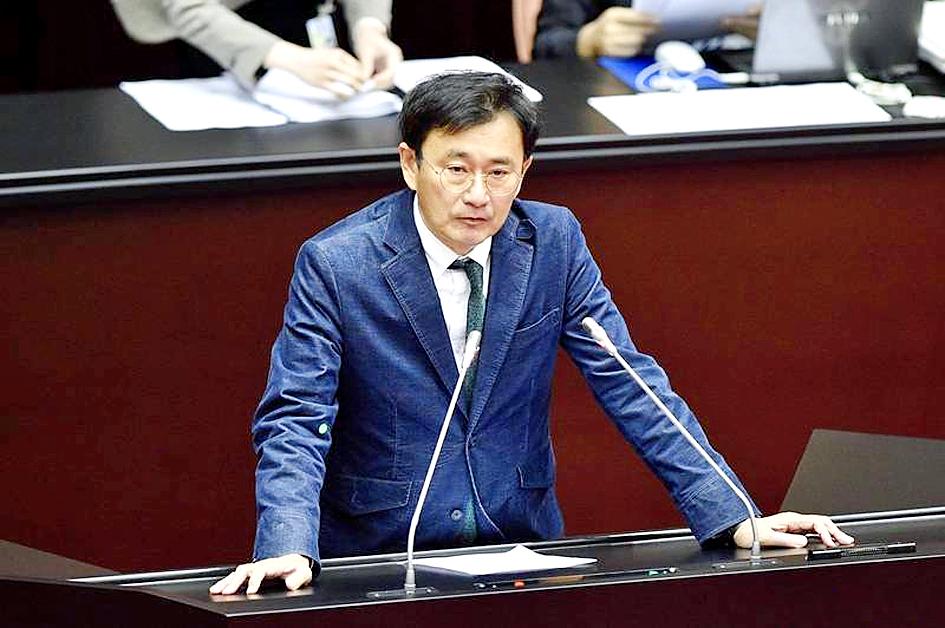Democratic Progressive Party (DPP) Legislator Huang Kuo-shu (黃國書) yesterday said he would leave the party and would not seek re-election, as he confirmed a report that he worked as an informant for the Chinese Nationalist Party (KMT) authoritarian regime when he was a student.
The Chinese-language Liberty Times (the Taipei Times’ sister newspaper) reported on Saturday that Huang, 57, worked as an informant for the KMT when he was in college.
Huang yesterday on Facebook said he accepts political responsibility for working with the authoritarian government to spy on his fellow students when he was in university and apologized to those affected by his actions.

Photo: Hsieh Chun-lin, Taipei Times
He also said he would resign from the DPP.
“Back then, I made friends with dissidents, and the authorities came to me saying that I would ‘run into trouble’ if I kept associating with the dissidents,” he wrote. “They told me that I would be protected if I helped them gather information.”
After several meetings with the authorities he believed them and cooperated with their demands, he wrote.
Huang did not specify for how long he provided information or when, only saying that he was in his early 20s at the time, which means he became an informant in the mid-1980s, not long before martial law was lifted in 1987.
“Since taking office [as a lawmaker] I have worked hard to promote Taiwan’s local history and culture. I believe that was my way of seeking redemption,” he wrote. “I cannot take back what I have done, but I still hope to contribute to Taiwanese society.”
Huang said he would finish his term as legislator and withdraw from the DPP afterward to perform cultural and public welfare roles.
DPP spokeswoman Yen Juo-fang (顏若芳) said the party respected Huang’s decision, as well as his “bravery in facing his past.”
DPP caucus whip Ker Chien-ming (柯建銘) praised Huang and said he hoped Huang would remain in the DPP to “help it defend Taiwan.”
DPP Legislator Fan Yun (范雲), who has said she was monitored by the KMT for years during the Martial Law era, said she was “shocked and deeply hurt” upon learning about Huang’s past actions, but that she also felt his admission was “an important first step” toward bringing facts to light.
DPP Legislator Mark Ho (何志偉) said he respected Huang, adding that he felt that during the Martial Law era it was not uncommon for people to do things that were uncharacteristic of them.
Asked about the issue, KMT Chairman Eric Chu (朱立倫) said he had no comment, but described it as the DPP’s factional infighting.
However, he said that the authoritarian government during the Martial Law era was a product of the times and was not the real KMT.
Chu said democracy in Taiwan has regressed under the DPP administration.
The DPP is an “authoritarian regime” that does not allow diversity or dissent, he said.
Additional reporting by Yang Chun-hui and CNA

The CIA has a message for Chinese government officials worried about their place in Chinese President Xi Jinping’s (習近平) government: Come work with us. The agency released two Mandarin-language videos on social media on Thursday inviting disgruntled officials to contact the CIA. The recruitment videos posted on YouTube and X racked up more than 5 million views combined in their first day. The outreach comes as CIA Director John Ratcliffe has vowed to boost the agency’s use of intelligence from human sources and its focus on China, which has recently targeted US officials with its own espionage operations. The videos are “aimed at

STEADFAST FRIEND: The bills encourage increased Taiwan-US engagement and address China’s distortion of UN Resolution 2758 to isolate Taiwan internationally The Presidential Office yesterday thanked the US House of Representatives for unanimously passing two Taiwan-related bills highlighting its solid support for Taiwan’s democracy and global participation, and for deepening bilateral relations. One of the bills, the Taiwan Assurance Implementation Act, requires the US Department of State to periodically review its guidelines for engagement with Taiwan, and report to the US Congress on the guidelines and plans to lift self-imposed limitations on US-Taiwan engagement. The other bill is the Taiwan International Solidarity Act, which clarifies that UN Resolution 2758 does not address the issue of the representation of Taiwan or its people in

US Indo-Pacific Commander Admiral Samuel Paparo on Friday expressed concern over the rate at which China is diversifying its military exercises, the Financial Times (FT) reported on Saturday. “The rates of change on the depth and breadth of their exercises is the one non-linear effect that I’ve seen in the last year that wakes me up at night or keeps me up at night,” Paparo was quoted by FT as saying while attending the annual Sedona Forum at the McCain Institute in Arizona. Paparo also expressed concern over the speed with which China was expanding its military. While the US

SHIFT: Taiwan’s better-than-expected first-quarter GDP and signs of weakness in the US have driven global capital back to emerging markets, the central bank head said The central bank yesterday blamed market speculation for the steep rise in the local currency, and urged exporters and financial institutions to stay calm and stop panic sell-offs to avoid hurting their own profitability. The nation’s top monetary policymaker said that it would step in, if necessary, to maintain order and stability in the foreign exchange market. The remarks came as the NT dollar yesterday closed up NT$0.919 to NT$30.145 against the US dollar in Taipei trading, after rising as high as NT$29.59 in intraday trading. The local currency has surged 5.85 percent against the greenback over the past two sessions, central